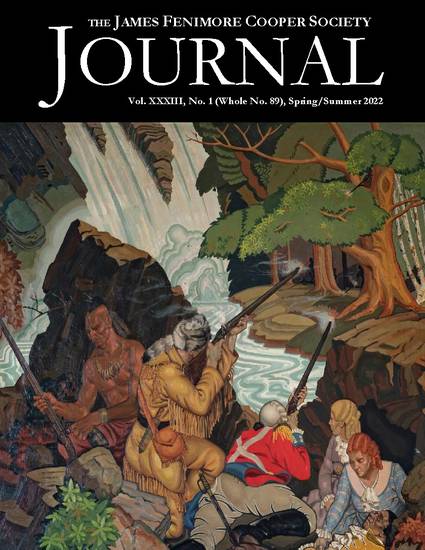
Article
“Neither Here nor There”: Transatlantic Liminality in James Fenimore Cooper’s The Autobiography of a Pocket Handkerchief
The James Fenimore Cooper Society Journal
(2022)
Abstract
James Fenimore Cooper merits much greater recognition as an important transatlantic American novelist. The range of his writing is impressive, from adventurous sea tales to cosmopolitan stories rife with incisive social and political commentary, set in North America and abroad. Cooper’s choice of topics reflects his diverse beliefs about various societies, politics, and the development of the United States as a new nation. He also investigates the relationship of the young U.S. to other nations linked by the Atlantic’s vast expanse and explores his country’s response to the growing numbers of immigrants, many from northern and western Europe, arriving on its shores after 1830. Cooper’s 1843 novella, The Autobiography of a Pocket Handkerchief (1843), written in the British tradition of object narratives, has been given relatively scant critical notice by scholars. This text, which its editors Matthew Wynn Sivils and James P. Elliott pronounce Cooper’s “most experimental,”1 merits closer examination because of the unique way the story is told: it is narrated by a female linen pocket handkerchief. The common flaxseed (Linum Usitatissimum) that grows into the novella’s narrator was collected from fields along the Connecticut River, transported by ship across the Atlantic destined for Ireland, captured by a French privateer, and subsequently planted in Normandy, France. There, she is harvested and spun into cambric for a fine French handkerchief before being sold to markets in Paris and New York City. According to her own history, she is “American by origin, European by emigration, and restored to its paternal soil by the mutations and calculations of industry and trade” (2). In recounting her saga, the handkerchief offers insights into the ways that materialism, economics, and class stratification shaped early nineteenth-century French and American societies. As an example of a crisscrossing transatlantic story, then, the novella warrants fresh consideration for its searing critique of exploitative conditions for workers in France and the greedy acquisitiveness of wealthy consumers in the U.S. during the 1830s and 1840s.
Disciplines
Publication Date
Spring 2022
Citation Information
Nancy Schultz, Melissa Carella and Jennifer Ray. "“Neither Here nor There”: Transatlantic Liminality in James Fenimore Cooper’s The Autobiography of a Pocket Handkerchief" The James Fenimore Cooper Society Journal Vol. 33 Iss. 1 (2022) p. 5 - 28 Available at: http://works.bepress.com/nancy-schultz/46/
